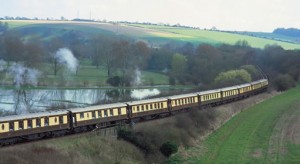Thirty-nine years ago, I served my first customer, working behind the bar of a pub in West London. I had taken the live-in job, aged 17, to escape from my fundamentalist Christian family and the cult I was being brought up in. I had no intention of going into a customer service job when I left school – it just happened.
A year or two later, I was working in my second pub. After one particularly busy Saturday night session, my boss told me that I had done well that night. I had worked at almost twice my normal pace, just to keep up with the number of customers that were waiting to be served. It felt great to be ‘stretched’, and the fact that I was praised at the end of the evening was the icing on the cake for me.
A few years later, and my first serious girlfriend nagged me into getting a ‘proper job’. I had always fancied working on the railway, and I wrote off and applied for a job as a steward on the restaurant cars at King’s Cross. A week or two later, I was invited for interview, and was selected for the job. I started in January 1979, and had absolutely no training whatsoever. I was put to work with a crew who were all old enough to be my father – some of them were old enough to be my grandfather! I was expected to know what to do, and felt too intimidated to ask anyone a question.
I persisted, working with some dreadful people, and some who were just about tolerable, until 1982, when I came across a man from Essex who offered me a day’s work on his train one day when I was on a standby shift. He was the sort of guy who didn’t mind getting his hands dirty, led from the front, was totally customer-focused but able to have a laugh – and most importantly, I felt I could ask his advice, speak to him, and not be laughed at. I soon found out that this man was respected throughout the railway – imagine how I felt when a week or two later I was told that he wanted me to work with him full time as a member of his team!
I spent a year working with this man before he went off to become a full-time trade union representative, and I learned any leadership skills that I have from him. Not very long after that I went off to work on the InterCity charter train fleet, where I led a team that was compared favourably to the Orient Express in terms of customer care. We used to take tourist trains around the Highlands of Scotland and did a lot of corporate work in the 1980’s too.
When I came back to the main line services in 1990, I was team leader on various Pullman trains for five or six years. Eventually, after a lot of trial and error, I managed to put a team together that stayed together for the best part of four years. When I met one of the members of that team recently, I asked her what she remembered about us all working together.
‘It was like a family’ she said. ‘I haven’t really worked in an environment like it since. We had standards, we knew you were there for us, and we were all doing the best we possibly could. And we never went home from work without being thanked’.
My friend could have added that I would never have dreamed of asking anyone to do anything that I wouldn’t do myself.
In the mid-1990’s the railways were privatised. On the East Coast Main LIne we got lucky. We had a Chief Executive in Christopher Garnett who knew how to create a great workplace too. It’s not rocket science, after all! He inspired me to get into learning and development.
So that’s why I do what I do. Because it IS possible to create a great workplace and to have people who want to come and work with you. It’s called caring, and lots of other words that people might dismiss as ‘pink and fluffy’. But it works. I know that, and that’s why I do what I do.

